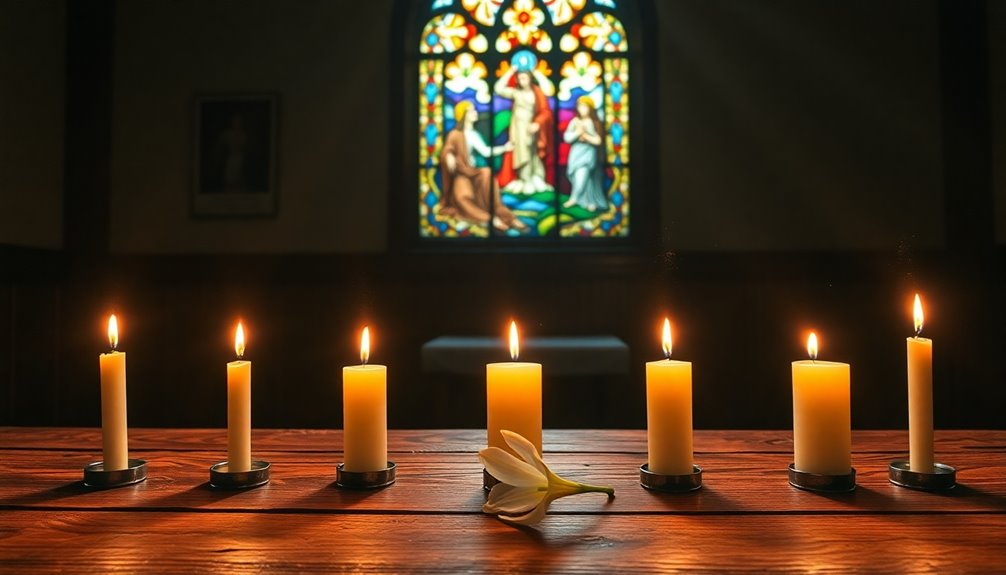In the Bible, the number 7 symbolizes divine perfection and completeness, appearing over 700 times. This significance starts with creation, where God rested on the seventh day, marking His work's completion (Genesis 2:2-3). You'll also see seven festivals that highlight holiness in worship (Exodus 23:14-17), and in Jesus' teachings, like "seventy times seven" for forgiveness, illustrating boundless grace (Matthew 18:21-22). The number shows up in various important narratives, emphasizing its role in spiritual growth and milestones. If you keep exploring, you'll uncover even more fascinating insights about the number's rich biblical meaning.
Key Takeaways
- The number 7 symbolizes divine perfection and completeness, appearing over 700 times in the Bible.
- It signifies the completion of God's work, as seen in the creation narrative's seventh day (Genesis 2:2-3).
- Seven festivals in Exodus highlight structured worship and holiness in God's plan (Exodus 23:14-17).
- Jesus' teaching on forgiveness, "seventy times seven," emphasizes boundless grace and mercy (Matthew 18:21-22).
- The seven churches and seals in Revelation represent the fullness of divine judgment and God's comprehensive redemptive plan.
Introduction

The number 7 holds profound significance in the Bible, representing divine perfection and completeness. You'll notice that this número 7 na Bíblia appears over 700 times, emphasizing its importance throughout scripture.
In the creation narrative found in Gênesis, God completed His work in six days and rested on the sétimo dia, estabelecendo o conceito de descanso sagrado. This act of resting not only marked the end of creation but also set a precedent for the importance of rest and renewal in our lives.
Moreover, the number 7 is connected to various sacred events and symbols. For instance, during Páscoa, there are seven days of celebration that highlight God's deliverance.
In the Book of Apocalipse, you encounter the seven trombetas, which symbolize the fullness of God's divine plan. Jesus even taught about forgiveness using the phrase "setenta vezes sete," showing that divine mercy knows no limits.
The number also signifies cycles of time, such as the year of jubileu occurring every seven cycles of seven years, reinforcing the themes of spiritual renewal and completeness.
Through these examples, you'll see how the number 7 encapsulates the essence of God's perfect design.
Biblical Significance of Seven

When you explore the biblical significance of the number seven, you'll find it woven throughout both the Old and New Testaments.
From God's creation of the world to the teachings of Jesus, seven often represents completeness and divine perfection.
Let's look at some primary and secondary references that highlight this powerful symbolism.
Primary Bible References
Throughout the Bible, the number seven embodies divine perfection and completeness, weaving its significance into various narratives and teachings.
In the creation story, you see that God rested on the seventh day (Gênesis 2:2-3), marking it as a pinnacle of His work. This act emphasizes a special kind of perfeição, highlighting how divine order culminates in completion.
In the book of Êxodo, God commands the observance of sete important festivals, showcasing His holiness and the structured way He desires His people to worship (Êxodo 23:14-17).
Additionally, the book of Apocalipse reiterates this theme with numerous references to seven, including the seven churches and seven selos, illustrating the fullness of God's plan for humanity (Apocalipse 1:4, 5:1).
Jesus also teaches about the unlimited nature of divine forgiveness when He instructs us to forgive "setenta vezes sete" (Mateus 18:21-22). This message promotes a culture of grace among believers, reinforcing the divine principles behind the number sete.
Ultimately, these primary references reveal how the number seven signifies the completeness and holiness integral to Deus and His creation.
Secondary Bible References
Seven pops up in various secondary references throughout the Bible, reinforcing its significance as a symbol of completeness and divine perfection. For instance, in Genesis, God rested on the seventh day, marking the completion of creation (Genesis 2:2-3). This act establishes the número sagrado of seven as a representation of divine rest and perfection.
In the Old Testament, Noah took seven pairs of clean animals into the Ark, highlighting the completeness of God's judgment and salvation plan (Genesis 7:2). The Israelites also celebrated the Feast of Unleavened Bread for seven days, a period that signifies purification and remembrance of their deliverance from Egypt (Exodus 12:15-16).
Moving to the New Testament, Jesus emphasizes boundless forgiveness by instructing Peter to forgive "seventy times seven," illustrating divine mercy's infinite nature (Matthew 18:21-22).
Furthermore, the Book of Revelation is rich with references to seven, including the seven churches and seven seals, all pointing to the fullness of God's plan for judgment and redemption (Revelation 1:4, 5:1). In these contexts, the significado of seven continually reflects divine perfection and completeness.
Ancient Civilizations Revered Seven

Revering the number seven, ancient civilizations across the world infused it with deep significance in their cultures and belief systems. The Babylonians recognized the número sete as crucial, often linking it to their lunar calendar, which featured a week of seven days.
The Sumerians also revered this número, associating it with their mythology that included seven major gods and seven sacred sites within their cities.
In Ancient Egypt, the significado of sete appeared prominently in religious practices. They observed seven days of mourning for the deceased and used seven sacred oils in anointing.
The Greeks honored the número sete through the famed Seven Wonders of the Ancient World and the seven celestial bodies visible to the naked eye, which they tied to their deities.
Meanwhile, in ancient Chinese philosophy, the número sete found meaning in the seven stars of the Big Dipper, essential for navigation and seasonal changes.
Across these civilizations, the número sete symbolized a connection to the divine and the cosmos, showcasing its profound influence on cultural and spiritual life.
Each society, in its unique way, celebrated the significado of sete, establishing a legacy that endures today.
Symbol of Divine Completion

The number 7 serves as a powerful symbol of divine completion in the Bible, encapsulating the idea of perfection and fulfillment. You can see this in the creation story, where God rested on the seventh day, marking the completion of His work (Gênesis 2:2-3). This divine act signifies that everything was made complete and perfect.
Throughout the Scriptures, the number 7 appears repeatedly, reinforcing its association with completude. In the Gospel of João, there are seven signs that highlight the fullness of Jesus' ministry and His miraculous works.
Additionally, the Book of Apocalipse presents the number 7 in various forms, such as the seven churches and seven selos, each illustrating a complete part of God's divine plan.
Moreover, 7 is often linked to purification, as seen in Levítico's rituals that span seven days, symbolizing total sanctification.
Even in matters of forgiveness, Jesus emphasizes the concept of "setenta vezes sete" (Mateus 18:21-22), urging you to offer boundless and complete forgiveness. This underscores that seven, as a number de Deus, truly embodies the essence of completeness in your spiritual journey.
Seven as a Lucky Number

You might think of the number 7 as a lucky charm, but in biblical terms, it holds a much deeper significance.
While many cultures associate it with fortune, the Bible presents 7 as a symbol of divine perfection and completeness.
Let's explore how these cultural interpretations often miss the true essence of what the number represents in scripture.
Debunk Common Misconceptions
Many people mistakenly associate the number seven with luck, but this belief diverges significantly from its biblical meaning. In scripture, the number seven carries a profundo significado simbólico, representing divine perfection and completeness. For example, God rested on the seventh day after creation, highlighting the sacredness of this number rather than any notion of luck.
When you look closely at biblical references, it becomes clear that the number seven appears over seven hundred times, emphasizing themes of order, holiness, and the authority of Deus. Each occurrence serves to reinforce God's covenant and promises throughout history, showcasing its importance in the divine plan rather than random chance.
The notion of luck associated with seven contrasts sharply with its true biblical significance. Instead of viewing it through a superstitious lens, you should recognize that the number seven embodies God's intentions for redemption and structure in the universe.
Believers are encouraged to appreciate seven for what it truly represents—perfeição and divine order—rather than attributing it to fleeting luck or trivial fortune. Embracing this perspective deepens your understanding of the number's true significance in the biblical narrative.
Cultural Interpretations of Seven
Throughout various cultures, the number seven is often celebrated as a symbol of good fortune and protection. In Western culture, you'll find that muitas pessoas consideram o número SETE é um número da sorte, associando-o a boas vibrações e proteção divina.
This belief often leads individuals to choose o 7 em jogos de loteria, esperando que isso aumente suas chances de ganhar.
In Eastern traditions, while the número SETE é reconhecido como auspicioso, especialmente na cultura chinesa, o número oito é considerado o verdadeiro número da sorte suprema.
Nonetheless, the significance of seven remains strong, representing transitions and cycles, like the seven phases of the moon or the seven days of the week.
Despite these cultural interpretations, it's essential to remember that na Bíblia, o número 7 simboliza a completude e a perfeição de Deus, contrastando com a visão popular do número como um talismã da sorte.
Seven Days of Rest

When you think about the concept of a weekly rest, it's not just about taking a break from work; it's a chance to reconnect with your spiritual side.
Gathering with others during this time fosters community and strengthens your faith.
Embracing this rhythm can bring peace and fulfillment into your life.
Reflect on Weekly Rest
There's something profoundly restorative about taking a break every seven days, a practice rooted in biblical tradition. In Gênesis 2:2-3, Deus descansou no sétimo dia após a criação, establishing a divine rhythm of work and rest. This foundational concept is echoed in o quarto mandamento, found in Êxodo 20:8-11, which commands you to remember the Sabbath and keep it holy.
Observing this day of descanso isn't just about physical rest; it's a chance to renew your spirit and reconnect with your faith. By setting aside the sétimo dia, you create a space for reflection, allowing you to pause the chaos of daily life and reassess your priorities.
It's a time to step back, breathe, and appreciate the world around you, as well as the presence of Deus in your life. This weekly ritual not only promotes physical and spiritual health but also serves as a reminder of the creation story and the power that comes from resting in faith.
Embrace this sacred time, and let it transform your week, nurturing your soul and drawing you closer to God.
Weekly Fellowship Gatherings
Weekly fellowship gatherings serve as a vital extension of the biblical principle of rest and renewal established on the seventh day. Just as God rested on the sétimo dia after creation, these gatherings provide you with an opportunity to step back from your weekly routine and focus on spiritual rejuvenation.
In the Jewish tradition, observing the Sabbath symbolizes a time for descanso and connection with God. For Christians, these gatherings often occur on Sunday, celebrating the resurrection of Jesus while echoing the sanctity of the sétimo dia. They serve as a reminder of the importance of community, encouraging believers to come together for mutual support and growth in faith.
Each week, you can engage in comunhão with fellow believers, sharing burdens and blessings alike. These meetings not only reinforce the values of rest and reflection but also help build a strong foundation of encouragement and love within your community.
Seven's Role in Spiritual Growth

The number seven plays a pivotal role in your spiritual growth, acting as a marker for significant milestones and transitions. In biblical contexts, sete é o número that represents perfection, often guiding you through various stages of life.
For instance, at age 28, you might find yourself focusing on security and financial stability, an important phase in your journey.
Jesus' teaching to forgive "seventy times seven" emphasizes the importance of boundless mercy and encourages you to embrace forgiveness as a vital part of your spiritual development.
Additionally, the seven-fold blessings and punishments from Deuteronomy 28 and Leviticus 26 offer a framework for understanding the rewards and consequences of living faithfully, allowing you to navigate your path with clarity.
Purification rituals also highlight the significance of seven, as seen in the seven days of cleansing in Leviticus. This symbolizes the completeness and dedication necessary for spiritual renewal.
Lastly, the cycles of seven years, particularly the Year of Jubilee, remind you to reflect, renew, and seek deeper communion with Deus para your spiritual journey, ultimately enriching your relationship with Him.
Additional Resources

As you explore the significance of the number seven in the Bible, consider utilizing various resources that can deepen your understanding. Books and commentaries on biblical numerology can provide insights into the meaning of seven, illustrating its role in representing completude e perfection.
Look for references that discuss the seven days of creation and the importance of the Sabbath, which can enhance your comprehension of divine order.
Online platforms, such as Bible study websites and forums, often feature discussions on key events involving the number seven, like the seven seals and trumpets in Revelation. Engaging with a community can help you grasp the broader implications of these symbols.
Don't overlook the teachings of Jesus, especially the concept of "setenta vezes sete" in Matthew 18:21-22, which emphasizes limitless forgiveness and mercy.
Additionally, attending lectures or workshops focused on biblical symbolism can enrich your interpretation of sacred festivals, including the seven days of the Feast of Unleavened Bread.
Frequently Asked Questions
Why Is the Number 7 the Number of God?
You might wonder why the number 7 is often seen as God's number. This number symbolizes completeness and perfection, reflecting divine order.
It's prominent throughout significant biblical events, like creation, where God rested on the seventh day. You'll find it in prophecies and teachings, emphasizing themes like forgiveness and fullness.
When you explore these instances, you'll see how 7 embodies God's perfect plan and His relationship with humanity.
What Does the Number 7 Mean in the Spiritual World?
In the spiritual world, the number 7 symbolizes divine perfection and completeness.
You'll find it connected to significant moments, like creation and rest, reflecting a higher order. It represents spiritual attributes, such as the seven gifts of the Holy Spirit, and emphasizes concepts like forgiveness and purity.
When you encounter 7, think of it as a reminder of wholeness and divine grace, urging you to embrace these qualities in your own life.
What Does the Bible Say About the Number 7?
The Bible emphasizes the number 7 as a symbol of completeness and divine perfection.
You'll find it woven through creation when God rested on the seventh day, as well as in significant events like Noah's selection of clean animals and the structure of spiritual rituals.
In Revelation, it appears frequently, illustrating the fullness of God's message.
Even forgiveness ties back to 7, with Jesus urging you to forgive endlessly, highlighting divine mercy.
What Does 7 Suns Mean in the Bible?
The phrase "7 suns" isn't found in the Bible, but you can explore how the number 7 often symbolizes completeness and divine perfection.
When you think about the imagery of the sun as a representation of God's glory, the idea of seven can amplify that light.










